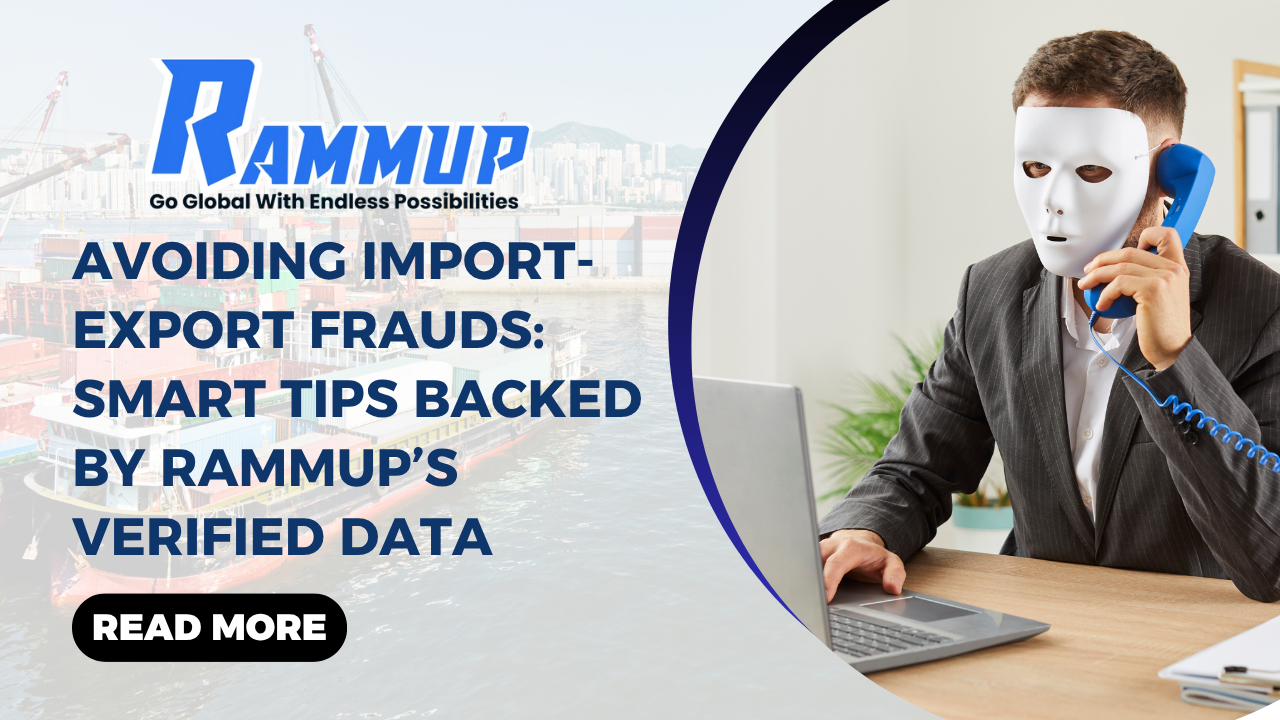Avoiding Import-Export Frauds: Smart Tips Backed by Rammup’s Verified Data

Trade Smart: How to Identify and Avoid Scams in Import-Export Deals
The import-export industry offers enormous opportunities for businesses to expand globally, tap into new markets, and increase revenue. However, with these opportunities come significant risks, including the threat of scams. Fraudulent activities in international trade can cost businesses time, money, and their reputation. At Rammup, we are committed to helping our clients navigate these challenges safely. In this blog, we will discuss how to identify and avoid scams in import-export deals.
1. Common Types of Scams in Import-Export
Understanding the most prevalent types of fraud is the first step toward protecting your business:
- Advance Fee Fraud: Scammers request an upfront payment for goods that are never delivered.
- Fake Documentation: Fraudsters use forged documents such as bills of lading, inspection certificates, and invoices.
- Phishing Scams: Cybercriminals trick users into revealing sensitive information via fake emails or websites.
- Overpayment Scams: The buyer sends a cheque for more than the agreed amount and requests a refund of the excess.
- Counterfeit Goods: Sellers deliver fake products that don’t match the specifications agreed upon.
2. Red Flags to Watch Out For
Being vigilant is crucial in international trade. Here are some warning signs that a deal might be fraudulent:
- Unverifiable Contact Information: Lack of a physical address or valid phone number.
- Generic Email Addresses: Use of free email services instead of official company domains.
- Unrealistic Prices: Offers that are too good to be true often are.
- Urgency or Pressure Tactics: Scammers often push for quick decisions or payments.
- Lack of Online Presence: A company with no website or limited online activity can be a red flag.
3. How to Verify Your Trading Partner
Before entering into a transaction, always do your due diligence:
- Company Verification: Check business registration documents and verify with local trade bodies or chambers of commerce.
- Background Checks: Use platforms like Rammup to access verified import-export data.
- References and R****2. Red Flags to Watch Out For
- Being vigilant is crucial in international trade. Here are some warning signs that a deal might be fraudulent:
- Unverifiable Contact Information: Lack of a physical address or valid phone number.
- Generic Email Addresses: Use of free email services instead of official company domains.
- Unrealistic Prices: Offers that are too good to be true often are.
- Urgency or Pressure Tactics: Scammers often push for quick decisions or payments.
- Lack of Online Presence: A company with no website or limited online activity can be a red flag.
4. Secure Payment Methods
Choosing the right payment method can significantly reduce the risk of fraud:
- Letter of Credit (LC): Offers security for both buyers and sellers.
- Escrow Services: Funds are held by a third party until both parties fulfill their obligations.
- Bank Transfer: Use only after establishing a trustworthy relationship.
- Avoid Cash Payments: These are untraceable and high-risk.
5. Protect Your Digital Presence
Digital scams are on the rise. Here are ways to secure your online communications:
- Use Business Emails: Avoid personal email accounts for professional communication.
- Two-Factor Authentication: Adds an extra layer of security to your email and trade platforms.
- Anti-Phishing Tools: Use security software that can detect and block phishing attempts.
- Regular Updates: Keep all systems and software updated to prevent cyber-attacks.
6. Work with Trusted Data Providers
Access to accurate and verified data is key in international trade. Rammup provides:
- Human-Verified Contact Information: Avoid dealing with fake entities.
- Detailed Trade Histories: Evaluate a company’s credibility through their trade patterns.
- Support Services: Expert assistance for data validation and due diligence.
7. Have Legal Protections in Place
Always have contracts and legal documents that clearly define the terms of the trade:
- Well-Defined Contracts: Specify product details, payment terms, delivery timelines, and penalties.
- Dispute Resolution Clauses: Include provisions for arbitration or legal actions.
- Use Legal Counsel: Consult with international trade lawyers to ensure your agreements are enforceable.
Conclusion
Scams in the import-export business can be devastating, but with the right knowledge and tools, you can significantly reduce the risks. Always perform due diligence, use secure payment methods, and rely on trusted platforms like Rammup for verified data. Staying informed and cautious can help you trade smart and succeed globally.
Start trading with confidence. Explore Rammup’s verified import-export data solutions today!


